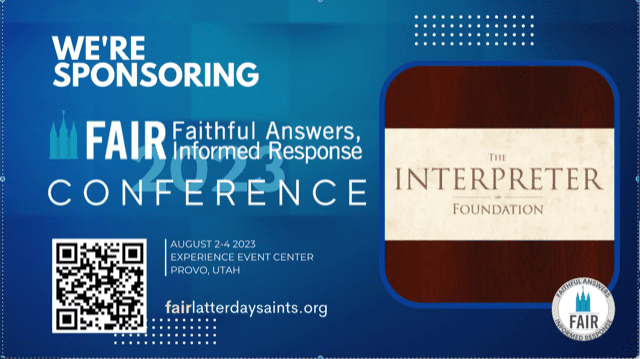
(Wikimedia Commons public domain photo)
Newly posted on the website of the Interpreter Foundation
“Conference Talks: The Future Isn’t What It Used to Be,” originally presented by Jeffrey M. Bradshaw on Saturday, 12 March 2016, at the 2016 Second Interpreter Science & Mormonism Symposium: Body, Brain, Mind, and Spirit.
Moreover, two new items went up yesterday on the Interpreter Foundation’s website:
Once again, Jonn Claybaugh has generously provided a set of concise but very helpful notes for students and teachers of the “Come, Follow Me” curriculum.
The New Testament in Context Lesson 31: “A Minister and a Witness”: Acts 22–28
During the 9 July 2023 Come, Follow Me segment of the Interpreter Radio Show, our volunteer hosts Martin Tanner, John Gee, and Kevin Christensen discussed New Testament lesson 32, “A Minister and a Witness,” covering Acts 22–28. Their conversation has now been liberated from commercial and other interruptions, archived, and made available to you, for your enjoyment and edification, at no charge and at your convenience.
The other segments of the July 9 radio show can be accessed at https://interpreterfoundation.org/interpreter-radio-show-july-9-2023.
The Interpreter Radio Show can be heard each and every Sunday evening along the Wasatch Front between 7 PM and 9 PM (MDT), on K-TALK, AM 1640, or you can listen to it from anywhere live on the Internet at ktalkmedia.com.
Finally, did I ever share this one? I’m not sure that I did. However, if I already have shared it there’s no harm in sharing it a second time. So, just in case, here it is: “Conference Talks: In the Visions of the Night: The Human Brain and Divine Revelation,” was presented by Brant A. Gardner at the 2016 Second Interpreter Science & Mormonism Symposium: Body, Brain, Mind, and Spirit, on Saturday, 12 March 2016.

I can’t say that I’ve suffered real persecution during my academic life or in other areas of my day-to-do living. But I have encountered genuinely surprising hostility on occasion, and many moments of awkwardness because of the attitudes of certain others. And, sometimes, when people didn’t (yet) know that I’m a Latter-day Saint, they’ve said some astoundingly bigoted things to me or in my presence about my church and my people. So this essay by Bridget Verhaaren, on the website of the Center for Latter-day Saint Arts, resonated with my own experience: “Fire Is a Chemical Reaction.”

Here are some passages that I marked when reading Paul Helm, Faith With Reason (Oxford: Clarendon Press, 2003).
one finds [John] Calvin insisting on the fact that everyone has the knowledge of God. Everyone has the sensus divinitatis, the seed of religion. (84)
Alvin Plantinga cites this passage from Calvin’s Institutes:
Lest anyone, then, be excluded from access to happiness, he not only sowed in men’s minds that seed of religion of which we have spoken but revealed himself and daily discloses himself in the whole workmanship of the universe. As a consequence, men cannot open their eyes without being compelled to see him. (85, citing John Calvin, Institutes of the Christian Religion, trans. F. L. Battles [London, 1960], I.v.I, pp. 51-52, as quoted in Alvin Plantinga, ‘Reason and Belief in God’, in Alvin Plantinga and Nicolas Wolsterstorff (eds.), Faith and Rationality (Notre Dame, Ind., 1983).])
From this sort of thinking, Plantinga draws a conclusion:
Calvin’s claim is that one who accedes to this tendency and in these circumstances accepts the belief that God has created the world — perhaps upon beholding the starry heavens, or the splendid majesty of the mountains, or the intricate, highly articulate beauty of a tiny flower — is entirely within his epistemic rights in doing so. It is not that such a person is justified or rational in so believing by virtue of having an implicit argument — some version of the teleological argument, say. No; he does not need any argument for justification or rationality. His belief need not be based on any other propositions at all; under these conditions he is perfectly rational in accepting belief in God in the utter absence of any argument, deductive or inductive. Indeed, a person in these conditions, says Calvin, knows that God exists. (85, citing Plantinga, “Reason and Belief in God,” 67; italics in the original.)
Calvin, Plantinga says, believed that “the conviction that the Bible is the word of God ought to rest ‘in a higher place than human reasons, judgements, or conjectures, that is, in the secret testimony of the Spirit” (85-86).
That, I think, might sound vaguely familiar to Latter-day Saints.
ETA: I should note, however, that my position is not identical to Calvin’s. I think that there are in nature, for example, intimations of the divine. But I do not believe them to be either compelling or sufficient grounds, in and of themselves, upon which to condemn an unbeliever.

Oppenheimer and, to an even greater degree, Barbie are smash hits. They have certainly helped bring theater-going back after the doldrums of COVID-19. In fact, Barbie appears to have transcended mere “film-ness” and to have become a social phenomenon, a bit like a more mainstream version of The Rocky Horror Picture Show. So, last night, my wife and I went to see Mission Impossible: Dead Reckoning Part One. We had intended to see Oppenheimer — we even thought we really had tickets — but it turned out that, for some reason, our online purchase hadn’t actually gone all the way through. So we caught a very late night screening of Mission Impossible, instead. Navigating through all the masses of clustered pink at our chosen multiplex was difficult, but not quite impossible, and we had a really good time. Besides, we didn’t need to wear pink.
In preparation for watching Oppenheimer, which is about three hours long, you might want to be humming this little ditty from the 1960s. It always puts me in a merry mood.













